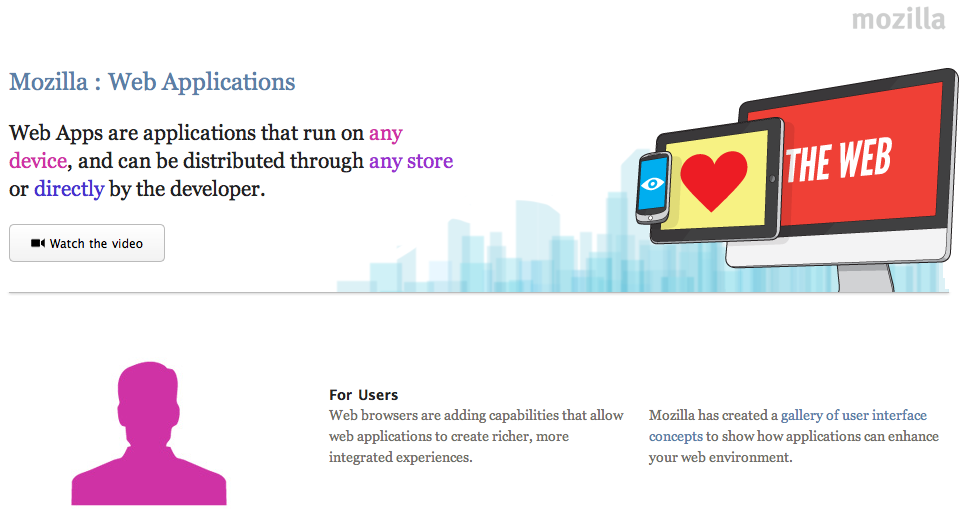At great long last, Mozilla has revealed the first developer release of their Web Apps Project, which aims to build the infrastructure for an open web app ecosystem.
Back in May of 2010, Google announced plans for what would become the Chrome Web Store. Mozilla responded immediately with plans for its own web store, now known as the Web Apps Project.
Perhaps unsurprisingly, Google was first to the punch; the Chrome Web Store launched in December, and we’ve been waiting for Mozilla’s “more open” rejoinder since. The initial phase of Mozilla’s project is finally here and shows that the company is making a serious attempt to take advantage of what few limitations there are in Chrome’s ecosystem. Of course, whether it can compete toe-to-toe in the long run remains to be seen.
As to what we can expect: Mozilla’s web apps will run on Firefox browsers on desktops, tablets and smartphones, just as Chrome web apps run on Chrome and (eventually) corresponding Android devices. Yet, the difference is that Mozilla wants to play nice with Chrome and others (which isn’t exactly a new trend, considering Google pays Mozilla to run their search bar in Firefox), by offering Chrome users the ability to use its web apps through the release of a plug-in.
For its part, Google has said that Chrome web apps will also run in other browsers, but we have yet to see that — or much talk of that, since the Chrome Web Store launched a few months ago.
In the spirit of the new and open web, these new Mozilla-backed applications can be built using HTML5 and Javascript, and developers can use the stable APIs, utilities, and documentation in this release to publish their app to users, or to create a web app store or directory. Users can review a gallery of user experience ideas and beta-quality versions of Firefox and Chrome add-ons that integrate the web app experience more tightly with the browser.
This all sounds like a good start to me, because I will tell you that while I am a fan of Chrome, when using web apps in the browser, the experience (IMHO) is almost identical to that of using a website. When I click on the app’s icon, it opens in a new tab, takes up the full page, and just opens the URL. In terms of front-end user experience, I’m left wondering why it was necessary to even download the app in the first place? (That being said, Chrome continues to add cool features like this to improve the overall usability of its web apps.) But, until the experience of a browser-based web app truly distinguishes itself (for the average non-techie) from that of visiting its sister website, it’s a zero sum game. This seems to be a big part of the reason why so many continue to prefer the experience of a native apps to that of web apps.
Web developers and designers are beholden to certain expectations when changing features of a company’s website that the designer of a company’s native app may not be. Take Facebook for example: every time the site’s profile template is changed or layout is toyed with, millions of people are up in arms, shouting for blood (myself included). With native apps, there are fewer expectations and strings attached — the canvas is essentially blank — so developers can start fresh and figure out how to optimize the best features of its website with the possibilities inherent in an app.
What’s cool about Mozilla’s conception of web apps is that they are now easier to find, launch and synchronize across mobile and desktop platforms — they can be grabbed and arranged with a single click and will hopefully keep my credit card information safe, while sharing information with other sites that is both safe and improves the experience of a web app in such a way that a traditional website could not.
The deeply integrated in-browser experience that will allow syncing of applications with mobile devices and native web browser and OS integration is still on the way (this primary release is really just aimed to familiarize developers with the platform’s capabilities). And considering Mozilla announced its final beta of Firefox 4 last week, it remains to be seen whether these features will make it into Firefox 4. Seeing as Firefox, unlike Chrome, is not the default browser on millions of Android devices, it had better make it in and it had better work well.
For developers, cross-platform fragmentation is a big problem when developing apps, requiring them to create different versions of the same app for different phones, different browsers, different OSes, and so on. Then trying to sync updates of an app across the various iterations? *Shudder*. In the case of web apps, if you have to use a specific browser to run a certain web app, then that app is by default a Chrome app or a Firefox app, etc. You’re locked in. Mozilla is resisting the Chrome web app paradigm — in which a web app is designed for a particular browser (Chrome) in a channel the proprietor controls — in the attempt to make the experience more packaged, wherein the user chooses the channel and the browser in which to run the app.
So, by giving developers the opportunity to create their own web app stores or publish apps directly to the user and, in turn, allowing users to use these apps on any device or desktop, the experience can hopefully become significantly more open. Though, knowing its many implications, I say “open” haltingly. Of course, Google has the advantage of its humungous cloud and, having created a better (speedier and less buggy, IMHO) user experience with Chrome, it will probably continue to be the more trusted source. Perhaps given time, Mozilla’s wonky idealism will prevail, but it still has a lot of ground to make up.
Check out the intro to the Web App Project below:





























Comment